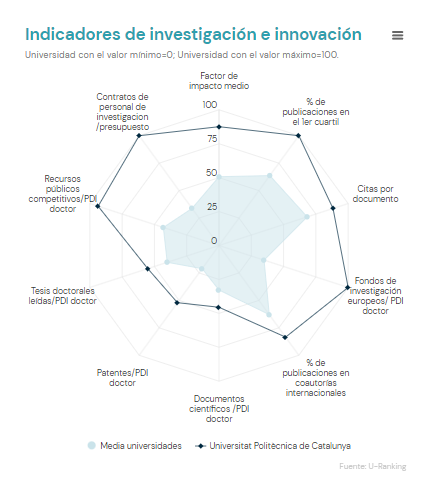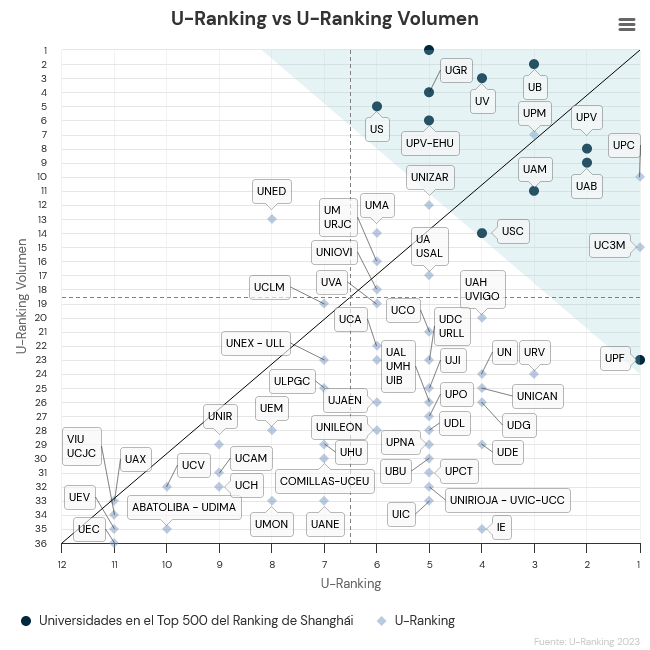The UPC is the leader in teaching, research and innovation and graduate employment according to the 2023 U-Ranking
In the latest edition of the U-Ranking the UPC appears as the top-ranked Spanish university in the overall classification. The University is also ranked 1st in teaching and 2nd in research and innovation. Additionally, it boasts one of the highest graduate employment rates among Spanish universities.
Jul 04, 2023
The 11th edition of the U-Ranking, an initiative by the BBVA Foundation and the Valencian Institute of Economic Research (Ivie), analyses Spanish universities based on 20 indicators grouped into two major dimensions: teaching and research and innovation. These dimensions are further divided into four areas: resources, production, quality and internationalisation. The 2023 edition analyses 71 institutions: 48 public universities and 23 private universities. The U-Ranking publishes two types of classifications: the U-Ranking, which sorts universities by performance, and U-Ranking-Volume, which sorts universities based on absolute values.
In terms of performance (U-Ranking), the Universitat Politècnica de Catalunya - BarcelonaTech (UPC) continues to be the top university in Spain together with the Pompeu Fabra University (UPF) and the Universidad Carlos III de Madrid (UC3M). In the teaching dimension, the UPC also remains the leader, sharing this position with five other universities. In research and innovation, the UPC remains 2nd.
In terms of overall volume (U-Ranking-Volume), the UPC is ranked 10th; in the teaching dimension, it is ranked 8th; and in the research and innovation dimension, it remains in the 6th position.
Outstanding indicators in research and innovation
In addition to the above classifications, the publishers of the U-Ranking produce a report per university, which contains several tables and interactive graphics showing the institution’s results in each indicator. The UPC stands out in the research and innovation dimension, in which it surpasses the national average in all indicators and achieves the best results in: European research funds per faculty members with PhD, research staff contracts over budget and percentage of publications in the first quartile, obtaining the maximum score (100) in all of them.

The UPC’s performance is higher than expected based on its volume indicators. This is reflected in the graph that appears in the comprehensive result report, which ranks institutions according to their results in the U-Ranking (performance) and the U-Ranking-Volume.

Leaders in graduate employment
The 2023 edition of the U-Ranking features a new tool to see the indicators of graduate employment by degree subject area and by university. The UPC is ranked 2nd-4th among 67 universities analysed (related news: The UPC is one of the universities with the highest graduate employment rate in Spain according to the U-Ranking).
With all these results, the UPC, along with the UC3M, is firmly placed among the best universities in terms of graduate employment and has also topped the overall ranking in the 2023 U-Ranking. Additionally, these are the only two universities ranking in the top ten in the specific rankings of teaching and research and innovation.
UPC bachelor’s degrees among the best in Spain
The ranking’s website also allows to obtain lists by area of study or bachelor’s degree. Based on the default weights proposed by the publishers—56% for teaching and 44% for research and innovation—several UPC bachelor’s degrees are ranked 1st in Spain in their respective areas either alone or together with degrees from other universities.
In Arts and Humanities:
Bachelor’s degree in Design, Animation and Digital Art
In Sciences:
Bachelor’s degree in Marine Sciences and Technology
Bachelor’s degree in Mathematics
In Architecture and Engineering:
Double bachelor’s degree in Aerospace Systems Engineering and Telecommunications Systems Engineering or Network Engineering
Bachelor’s degree in Informatics Engineering
Bachelor’s degree in Food Engineering
Degree in Architecture Studies
Bachelor’s degree in Geoinformation and Geomatics Engineering
Bachelor’s degree in Landscape Architecture
Bachelor’s degree in Marine Technologies
Bachelor’s degree in Architectural Technology and Building Construction
Bachelor’s degree in Civil Engineering
Bachelor’s degree in Nautical Engineering and Maritime Transport
In Industrial engineering:
Double bachelor’s degree in Aerospace Systems Engineering and Telecommunications Systems Engineering or Network Engineering
Bachelor’s degree in Industrial Technologies and Economic Analysis
Bachelor’s degree in Materials Engineering
Bachelor’s degree in Chemical Engineering
Bachelor’s degree in Biosystems Engineering
Bachelor’s degree in Automotive Engineering
Bachelor’s degree in Aerospace Systems Engineering
Bachelor’s degree in Energy Engineering
Bachelor’s degree in Industrial Electronics and Automatic Control Engineering
Bachelor’s degree in Mechanical Engineering
Bachelor’s degree in Electrical Engineering
Bachelor’s degree in Biomedical Engineering
Bachelor’s degree in Industrial Design and Product Development Engineering


